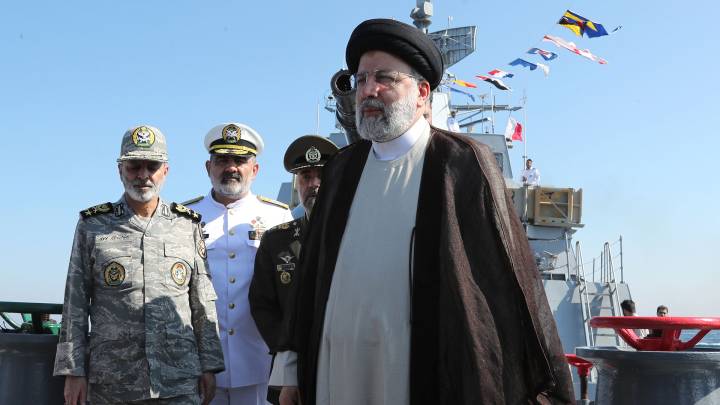For years, Gershon Baskin has been negotiating with Hamas officials. But for the British-Israeli peace activist, one thing is clear: the massacre on October 7 has deprived Hamas of any legitimacy. A conversation about a path to peace and what is needed to achieve it.
zenith: You have negotiated with Hamas representatives for more than a decade, for example over the release of Gilad Shalit, the soldier who was kidnapped in 2005. After years of deadlocked negotiations, Israel agreed to a deal in 2011. Among the 1,027 prisoners released for Shalit were fighters who had, in total, killed almost 600 Israelis. How are human lives weighted in such a prisoner exchange?
Gershon Baskin: We did not weight human lives. The Egyptians had already set the terms of the exchange six months after Shalit's abduction: 1,000 Palestinians for one Israeli. Prime Minister Ehud Olmert refused. But after five years, the pressure within Israeli society grew ever greater. Shalit came from a family with social capital, or to put it cynically: It was a white, Ashkenazi Jewish family that knew how to mobilize the streets. In 2011, thousands took to the streets demanding reforms and social justice–and the Shalit case became one of its many causes. In the end, it was political pressure that made Netanyahu negotiate and agree to the deal.
So you didn’t keep renegotiating, proposing other options and gauging of both parties’ room for manoeuvre?
No. The number of Palestinian prisoners for an exchange deal had been fixed since 2006. My job was to minimize the security risks.
You recently stated in an article that you are tired of hearing that the Israeli government is doing everything it can to get the hostages back and is leaving no stone unturned. What did you mean by that?
I watched for years as Netanyahu declared in public that the photo of Gilad Shalit was on his desk and that he was “facing him every day.” At the same time, however, his government rejected negotiations with Hamas. In the current crisis, Netanyahu's war cabinet is merely making assumptions. About what Hamas leader Yahya Sinwar wants, under what conditions and military pressure he can be forced into a deal. The truth is that the government does not know and is gambling at the expense of the families of the hostages and the Palestinians in Gaza.
‘We cannot just simply accept civilian casualties’
You have also doubted that the Qataris hold direct communication channels to Hamas and consider it more likely that Egypt has influence over the Qassam Brigades. How do you arrive at this assessment?
First of all, there are no direct communication channels from Qatar to Hamas officials in the underground tunnels of the Gaza Strip. Instead of digital communication channels, Hamas relies on analogue communication channels: via cables that extend through the tunnel system. Hamas literally passes written notes to communicate with the outside world. If there is one person who has contact with Hamas leaders on the ground and is based in Doha, it is Khalil Hayya: The former deputy head of Hamas in the Gaza Strip was sent to Qatar as a mediator shortly before the massacre. But these channels work very slowly and are unstable in view of the war in Gaza. The Egyptians, on the other hand, have direct communication channels into the Gaza Strip and have already proven that they can negotiate ceasefires–such as in 2014 with Hamas and then in 2021 with the Islamic Jihad group. It is simply easier for the Egyptians to keep these lines open.
How far can Israel go in negotiations with Hamas?
We could make more concessions: Regarding the imprisoned Palestinians, a ceasefire and humanitarian pauses, and we should accept most of Hamas’ demands if they are reasonable. I would not say this publicly if I were the government, but Israel should accept almost any condition from the other side.
“Civilian casualties are not collateral damage,” you argue in your article. Are you accusing the Israeli Defense Forces of deliberately neglecting the scope of civilian casualties in Gaza and thus violating international law?
No. I don’t believe that the IDF is deliberately committing war crimes or carrying out operations arbitrarily. My point is that civilian casualties are more than mere numbers. They are human beings with dreams and goals for their lives. At the end of the day, we have to break the cycle of violence, which is why we cannot just simply accept civilian casualties.
Is that more of a moral statement than a legal one?
Yes.
Does the Israeli government have the legitimacy to wage this war with maximmalist military goals in mind?
In a democracy, legitimacy derives from the people who elect the government. It is undisputed that the Israeli people stand behind the government’s main objective: to eliminate Hamas as a military force and civilian government in the Gaza Strip. Moreover, a large part of Israeli society is demanding that the Netanyahu government take political responsibility and resign after this war–and a minority is already calling on the cabinet to step down immediately.
Do you agree?
Netanyahu should be in jail – convicted for corruption and fraud – and for leading us to where we are today. But let me add this: The entire international community bears responsibility for what has happened.
‘Any control without Palestinian leadership will just be another form of occupation’
…for October the 7.?
…for the notion, that Israel can keep occupying Palestinian territories without impunity.
You have laid out a plan for a ceasefire and a restart of the peace process. Among other things, it includes a reform of the Palestinian Authority, a Marshall Plan for Gaza, and a new phase of negotiations on territorial issues. A realistic proposal?
We must be clear about this: Any control without Palestinian leadership will just be another form of occupation. That is why we have to liberate the Palestinians from that very occupation. The best scenario we can aspire to is a multinational Arab coalition supporting the new civilian government in Gaza–under Palestinian leadership. Commitment to the two-state solution means recognition of the state of Palestine by all countries, including by admission as a full member of the United Nations.
Would a restart of the peace process have a better chance to succeed under a different Israeli government–under the leadership of Yair Lapid or Benny Gantz, for example?
Yair Lapid bears as much responsibility as Netanyahu for refusing to engage with the Palestinian issue. And when Gantz campaigned for his newly founded party HaMachane HaMamlachti in the 2018/2019 elections, he published a video of himself boasting about how many Palestinians he had killed during the 2014 war. Neither of them, neither Lapid nor Gantz, will bring about the necessary change of heart to get the peace process back on track.
Who could succeed in that endeavour?
The Americans could exert the necessary pressure on Israel. It is time for the Biden administration to listen to the progressive wing of his Democratic Party. In fact, the US is also increasing the pressure in some areas. This week, for example, Biden threatened that his administration would no longer grant visas to violent settlers.
‘We need peace agreements, even if we don’t trust each other’
Will that be enough?
No. But the Biden administration could urge Israel to cooperate. Without American military aid, the Israeli army would soon collapse. If the Americans wanted to, they could very well force Israel to withdraw from the Gaza Strip and engage in a peace process.
What would be other conditions for a restart of the peace process?
There must be a change in the culture of negotiations: The Oslo Process was guided by the Kissinger principle of ‘constructive ambiguity’. Important issues were deliberately left unmentioned in order to keep the talks going. At no point during the negotiations was it agreed that Israel would not expand the settlements in the West Bank. It was assumed that Israel would not act like this–but there were no clear verification implementation mechanisms. This ultimately led both parties to violate agreements rather than gradually comply with the demands of the other side.
As former German Chancellor Angela Merkel declared in the Knesset back in 2008, Israel’s security is part of Germany’s raison d'être. German politicians often interpret this as unconditional solidarity with the Israeli government. What role can Germany play in conflict resolution?
I have spoken to many German and European diplomats over the past two decades. Many of them told me in private that the two-state solution was no longer feasible–but they still mentioned it in every resolution that was passed. Germany must understand that justice for Israel also requires justice for the Palestinian people. When Israel was founded, the Palestinians became collateral damage. I call for solidarity with the vision of 7 million Israelis and 7 million Palestinians living in coexistence from the river to the sea–two states for two peoples. Germany must recognize the state of Palestine as soon as possible.
The massacre on October 7 was also an attack on Israeli civil society. Like many others, you have lost friends and colleagues. Among them was the well-known peace activist Vivian Silver, whom you described as a “moral compass.” How can Israeli civil society recover from this shock?
Both sides of this conflict are rewriting their collective memory these days. We will not forget. There is no reason to forget. But we also need to talk to each other. Instead of waiting for both sides to build trust in each other, we need to introduce monitoring and verification mechanisms under international control and to meet at the negotiating table. We need peace agreements, even if we don’t trust each other.
Dr. Gershon Baskin, 67, is a British-Israeli analyst and peace activist. He is the Middle East Director of the London-based NGO International Communities Organization. Baskin received his doctorate from Greenwich University in 1994 with an analysis of Sovereignty and Territory in Jerusalem. He has been negotiating with Hamas representatives for more than 15 years and was the lead mediator for the Gilad Shalit prisoner exchange in 2011.




